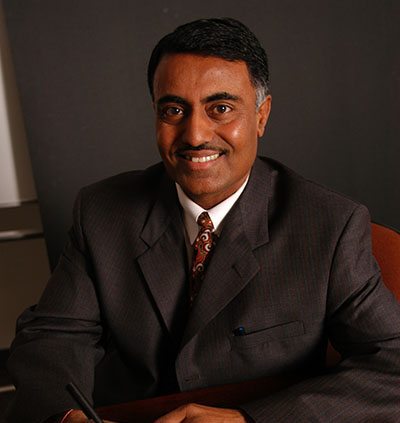Advocating for the Sustainable MBA

For School of Business associate dean, Satinder Dhiman, rethinking the MBA degree to incorporate sustainability isn’t a theoretical exercise. As he sees it, it’s a business–-and societal-–imperative.
“Businesses are following the typical model in which the entire focus is on maximizing shareholder value,” Prof. Dhiman says. “When we follow that model in an unbridled manner, we do not take into account the total cost of a business to the environment. The mindset that rationalizes the business model without paying attention to the social, economic and emotional lens, the philosophical and spiritual footprint, dooms us to something that is irreversible.” Instead, he says, businesses – and business educators — need to look at “our shared destiny.”
“When I say ‘we,’ I mean all stakeholders — not just shareholders, but society at large,” he says. “We need to look at public policy. We need to consider future generations. We need to take that holistic view. We need to consider our total footprint. Businesses are still very far from that mindset.”
Prof. Dhiman embraces the World Mission on Environmental Development’s 1987 definition of sustainability (“sustainable economic development means meeting the needs of the present without compromising the ability of the future generations to meet their needs”) and suggests that the transformation begins with business schools raising awareness, “much as we did when we began preparing our leaders for ethical challenges after the Enron debacle.”
“We realized then that profit is not the be-all and end-all of business,” he recalls. “The focus needs to be on the total impact of the business and the need for everyone involved — not just R&D, not just top leadership — to be looking at his or her behavior/contribution. Businesses must be harbingers of evidence-based, not opinion-based, research about sustainability — empirical, replicable research that shows beyond doubt that the way things are can’t be sustained.
“In reflecting on the next generation of business professionals, we’re talking about a ‘renovated’ MBA, one that integrates sustainability, plus a little bit more,” Prof. Dhiman suggests. “It’s not a class or two here and there. Addressing sustainability should become the norm across the MBA curriculum—the warp and woof of business education, whether marketing, leadership or finance. How about sustainable accounting practices? How about sustainable investing? How about sustainable luxury?”
Indeed, in his view, sustainability shouldn’t be limited to the School of Business. “It’s something that should resonate with all schools,” he says. “I cannot imagine (the School of) Architecture saying, we don’t want sustainable buildings. I can’t imagine Design people saying, we don’t want sustainable design. Sustainability R us!”
“I have no doubt that teaching and education can make this transformation happen,” Prof. Dhiman says. “Change always occurs in this way, within the halls of academia where we nurture and cultivate leaders. Leaders who are difference-makers; leaders who touch future.”
Consider his 2016 summer sustainability class, which included students from different majors – six from architecture and 10 studying business, and different cultures, seven from the Middle East. Among other things, they explored whether meat-eating was sustainable or whether a plant-based diet was preferable. Students did research, shared videos and presented evidence. Six became vegetarian at the end of seven weeks, two from cultures where meat is a significant part of almost every meal. Change happened.
And that, he offers, goes to the very mission of higher education. “My role as a teacher and an administrator is to help create a sense of urgency,” Prof. Dhiman says. “A business cannot be a business in the old school sense of ‘the business of business is business.’ We need a different kind a vision, one that places sustainability at its heart.” After all, we only have one planet to live; let’s cultivate it together!
__
Dr. Satinder Dhiman – associate dean of the School of Business, MBA Chair and director and Professor of Management — teaches MBA-level courses on organizational behavior, ethical leadership, and strategy. He has given 50 Invited Keynotes, Commencement Addresses, Plenary Sessions, Distinguished Key Guest Lectures and Creative Workshops—nationally and internationally. He is author, co-author, and co-editor of 17 books, the most recent of which include Holistic Leadership: A New Paradigm for Today’s Leaders (Palgrave, 2017) and Gandhi and Leadership: New Horizons in Exemplary Leadership (Palgrave, 2015). His recent co-edited works, with Dr. Joan Marques, include Spirituality and Sustainability (Springer, 2016) and Leadership Today (Springer, 2016). His forthcoming book, Conscious Consumption (Routledge, 2019), will explore the ethics and sustainability of a vegan and whole food plant-based diet. In August this year, Professor Dhiman and Dean Marques will publish a major reference work on engaged sustainability (Springer, 2018).